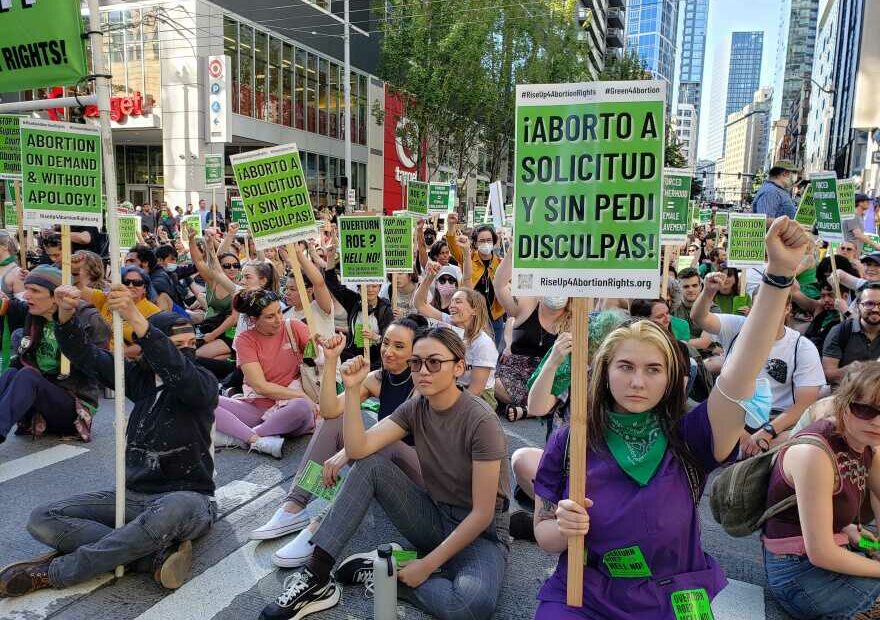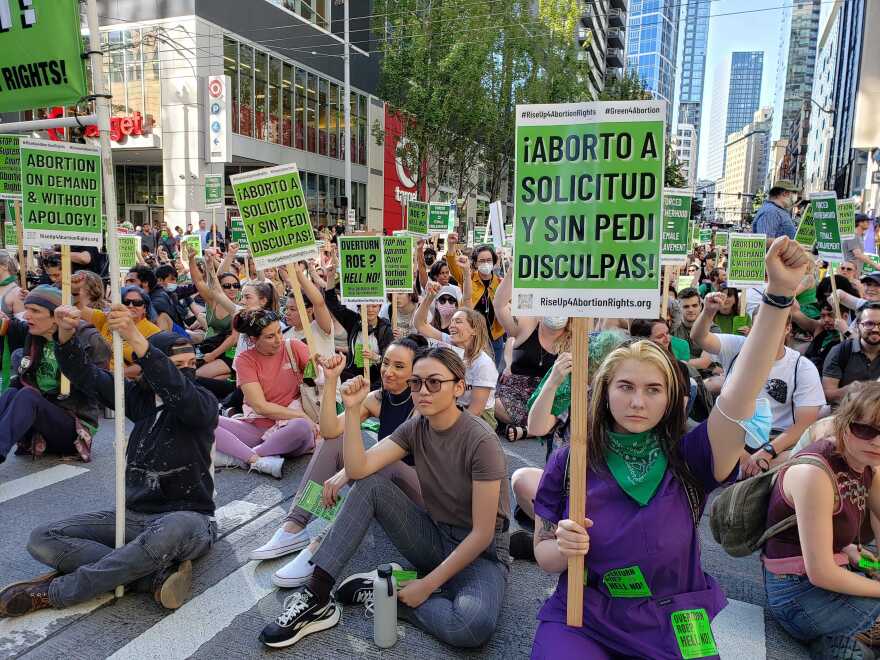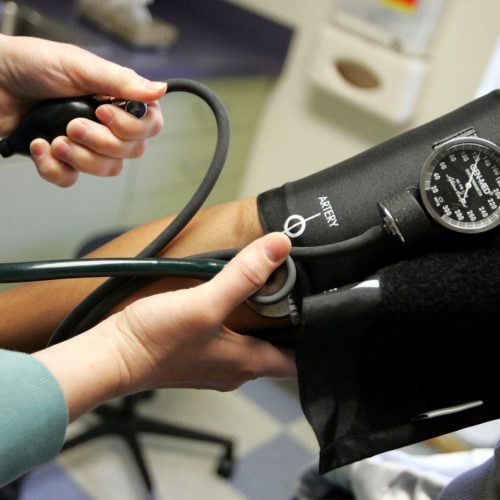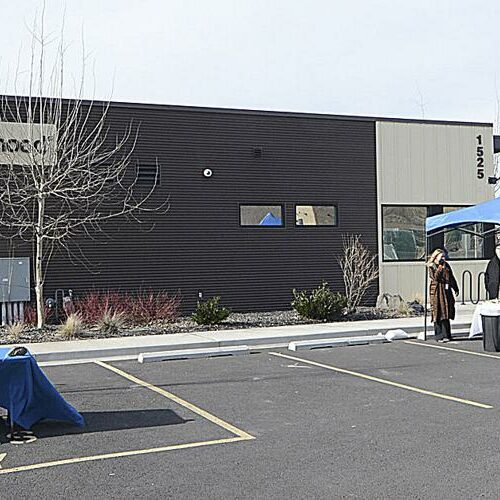Under a blazing sun at the steps to the state Capitol on Saturday, Washington Gov. Jay Inslee kicked off a news conference that sounded more like a political rally.
It had been little more than 24 hours since the U.S. Supreme Court had reversed nearly half-a-century of constitutional protection for abortion.
Inslee, facing a crowd that had gathered on the Capitol steps, called the Supreme Court’s decision in Dobbs v. Jackson Women’s Health Organization “radical and un-American.”
As he spoke, Inslee was flanked by several Democratic state lawmakers, including state Rep. My-Linh Thai of Bellevue who told the story of getting pregnant despite using contraception while in school to become a pharmacist and choosing to have an abortion.
“I made a choice, a choice that would afford me to finish my education, a choice that would impact my future, a choice that would allow me to have a healthy family when I am ready,” Thai said to shouts of support from the crowd.
The message on Saturday from the Democrats gathered at the Capitol was clear: even as Republican states were shutting down access to abortion in the wake of the U.S. Supreme Court ruling, Washington was preparing to double down on its history as a state that has, for decades, protected abortion rights. Inslee said Washington would become a “sanctuary state” for those seeking an abortion and added that Washington, Oregon and California would create a “wall on the west coast” where people can safely and freely access abortion services.
“Mike Pence and the Republican Party have a plan to take away this right from Washington women and we intend to stop them, and we intend to stop them right here,” Inslee said to cheers, referring to the former vice president’s call for an end to abortion in all 50 states.
For now, Washington law is unambiguous and unchanged by the Supreme Court decision. It says: “The state may not deny or interfere with a woman’s right to choose to have an abortion prior to viability of the fetus, or to protect her life or health.”
But laws can be changed and Inslee now wants to enshrine that right in the state constitution.
“Accordingly, I will be asking the legislators to pass a constitutional amendment under our state’s constitution to protect women in our state,” Inslee said Saturday.
On Monday, the Democratic-led California Assembly took a step toward explicitly protecting the right to abortion and contraception by passing, on a two-thirds vote, a constitutional amendment that will now appear on the November ballot.
But while Democrats enjoy super majorities in California, they do not in the Washington Legislature. And minority Republicans in Washington have shown no willingness to lend their votes to a constitutional amendment protecting abortion rights. As in California, amending Washington’s constitution requires a two-thirds vote of the Legislature followed by a vote of the people.
Last week, Democratic state Sen. Jamie Pedersen of Seattle, an attorney who formerly chaired the Senate Law and Justice Committee, was blunt about the prospects of amending the constitution.
“It seems very unlikely that a constitutional amendment could pass unless you had a real change in the views of Republicans in the state,” Pedersen said.
That partisan chasm was on display Saturday as Inslee and state Rep. Drew Stokesbary, a King County Republican, sparred on Twitter. First, Inslee tweeted a link to a KING 5 News story that quoted Stokesbary as saying abortion rights are the “law of the land” in Washington and that he “would be unlikely to go along” with a constitutional amendment enshrining that right.
“The ‘trust us’ line is what resulted in the overturning of Roe v. Wade. We’re not buying it,” Inslee tweeted.
Stokesbary tweeted back calling Inslee a “coward” for not using Stokesbary’s Twitter handle when tweeting about him and saying: “I’m still waiting for a single constituent to say they want this constitutional amendment. Meanwhile thousands say they can’t afford gas and groceries thanks to your party’s failed policies and don’t feel safe thanks to your failed police reforms.”
As an alternative to a constitutional amendment, Inslee has floated another idea: trying to get the Washington Supreme Court to consider whether the state constitution’s privacy clause protects the right to abortion.
“The court might well find that our state constitution already does protect a right of a woman … to make a decision about her own body, but it’s not so easy to get that question in front of the court,” said Hugh Spitzer, a University of Washington law professor and state constitution expert.
Unlike in some states, the Washington Supreme Court does not issue advisory opinions, Spitzer explained. Another route might be to seek a declaratory judgment where the court would weigh in on the question of a constitutional right to abortion without the normal process of litigation.
But Spitzer said the court won’t issue a declaratory judgment “out of the blue” without some sort of actual dispute and, according to the Legal Information Institute at Cornell Law School, a declaratory judgment is not enforceable.
So, what else might the governor and Democratic state lawmakers do to solidify abortion rights in Washington?
In the short-term, Inslee plans to issue an executive order barring the Washington State Patrol from cooperating with other states seeking information on people who come to Washington for an abortion. Inslee also said he’s freed up $1 million in reserve funds to help cover the cost of an abortion for low-income individuals.
Longer-term, state Rep. Jessica Bateman of Olympia told the crowd at the Capitol on Saturday that majority Democrats are considering an array of new policies to “strengthen reproductive health care in Washington and protect access to safe and legal abortion.” That could include added protections for medical providers and increased patient privacy protections.
“In Washington, safe abortion will remain legal and we welcome those coming to our state to seek access to their reproductive freedom,” Bateman said.
By contrast, state Republicans were largely muted in the wake of the Supreme Court decision. On Saturday, Inslee accused them of masking their intent to overturn abortion rights if given the chance.
“They are trying to hide their own position, but on this issue they can run but they cannot hide,” Inslee said.
While the Washington State Republican Party’s 2020 platform defines human life as beginning at conception and opposes the use of public funds for abortion, Senate Republican Leader John Braun of Centralia told KING 5 News Inslee was engaging in “fear-mongering.”
He noted Washington voters enacted abortion rights through an initiative and said, “there’s no history of issues this big being undone without additional acts of the people.”
In a three-sentence statement following the abortion ruling, Braun called for “Compassion and empathy, rather than hostility” and said the state should increase support to “pregnant women who choose to give birth.”
Republicans, who expect to pick up seats in the state Legislature this year, also say they’re focused instead on issues like crime and inflation.
Polls show support for abortion rights is strong in Washington. For example, a 2014 Pew Research Center survey found 60 percent of adults in the state believe abortion should be legal in all or most cases.
Still, some Republican lawmakers routinely introduce bills to curb abortion rights. Among them is state Sen. Mike Padden of Spokane Valley whose opposition to abortion inspired his first run for the Legislature in 1980.
Padden — who said Washington has a “radical extremist pro-abortion policy” — quickly seized upon the overturning of Roe v. Wade to call for new restrictions in Washington, including requiring parental notification and a ban on abortions based on a belief a fetus has Down syndrome.
“These are reasonable laws that would be supported by the vast majority of citizens in our state, and the Supreme Court’s decision in the Dobbs case at last allows the people to have a voice,” Padden said in a statement.
Outside of the West Coast, other states are also taking steps to solidify abortion protections. In Vermont this fall, voters will decide a proposed constitutional amendment that guarantees “reproductive autonomy.” And in Michigan, abortion rights backers are attempting to get a constitutional amendment qualified for the November ballot in that state.




















